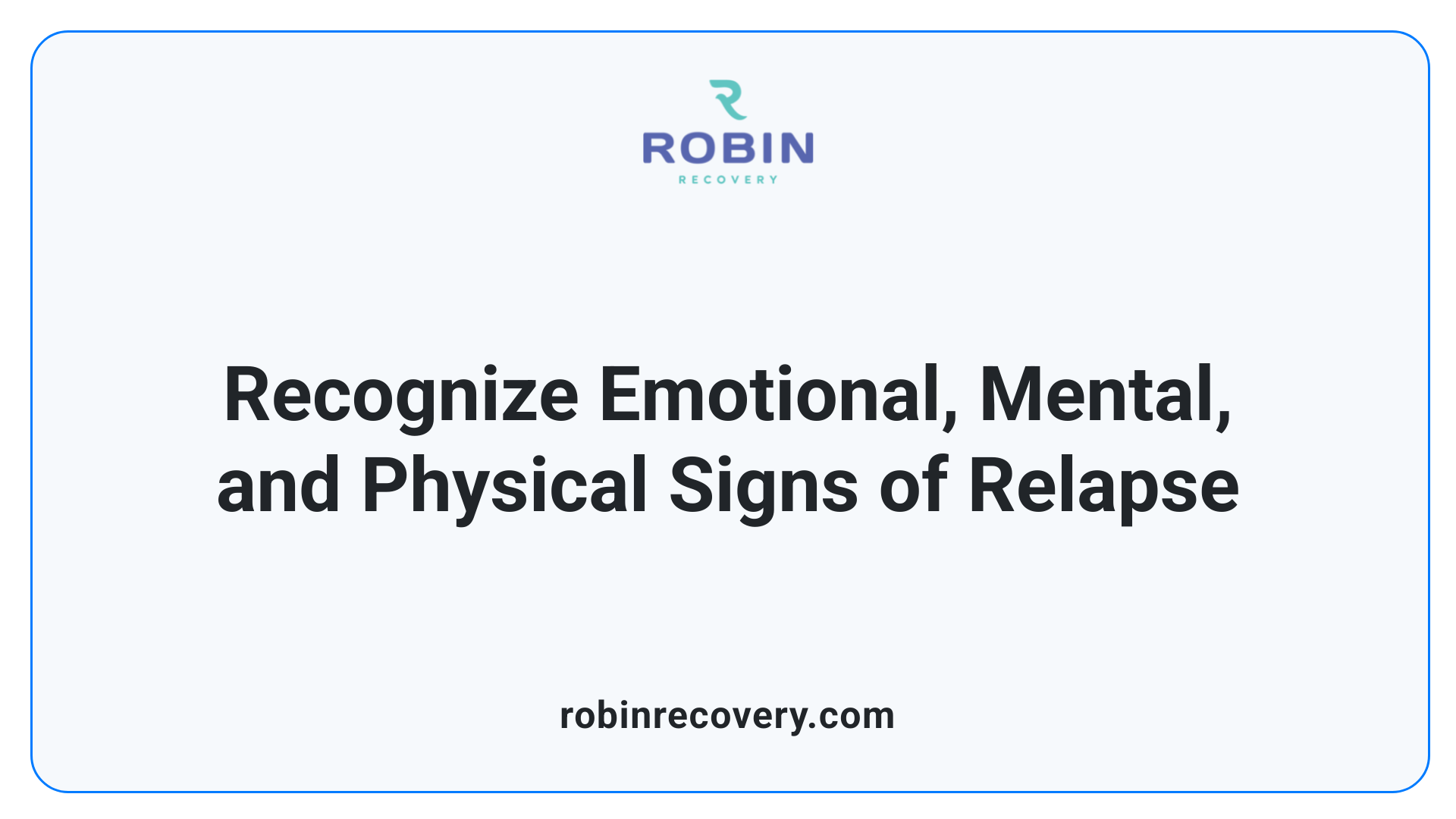When a Friend Suffers a Relapse

Understanding Relapse and Compassionate Support
Relapse is a common yet challenging part of addiction recovery, affecting many individuals on their journey to sobriety. Recognizing the stages, signs, and effective ways to support a friend through relapse is crucial for fostering recovery and maintaining emotional well-being. This article explores the intricacies of relapse, how to identify it early, and how to respond with empathy and practical strategies.
The Stages of Relapse in Addiction Recovery

What are the stages of relapse in addiction recovery?
Relapse in addiction recovery is a process that unfolds in multiple phases, rather than occurring suddenly. Recognizing these stages can help individuals and their support networks intervene early and prevent a full return to substance use.
The three main stages are emotional relapse, mental relapse, and physical relapse.
Emotional relapse is the earliest phase. During this stage, a person might feel anxious, irritable, or overwhelmed but may not realize these emotions are signs of upcoming relapse. Common behaviors include isolating from others, neglecting self-care, and suppressing feelings. This stage is crucial because it often occurs before the individual consciously thinks about drinking or drug use.
Mental relapse follows. At this point, thoughts about substance use start to surface. The individual may romanticize past drug use, experience cravings, and begin internal bargaining—convincing themselves they can use just once or control their intake. Social influences, like recalling old friends involved in substance use or posting images related to drinking or smoking on social media, can trigger mental relapse.
Physical relapse is the final stage, where the individual begins actual substance use again. This could start with a lapse—using drugs or alcohol briefly—and may escalate to a full relapse if not addressed. Physical relapse is often preceded by warning signs such as loss of energy, physical appearance changes, or observable intoxication.
Understanding these stages can facilitate early intervention. Supporters and individuals in recovery are encouraged to watch for signs like withdrawing from others, craving, or rationalizing substance use. Strategies like seeking professional help, engaging in support groups, and practicing coping skills are vital to catching relapse early and maintaining long-term sobriety.
Identifying Early Signs and Warning Indicators

What are common emotional signs of relapse?
Recognizing emotional changes is an important part of preventing relapse. Common emotional signs include feelings of anger, mood swings, anxiety, and defensiveness. People may notice an increase in irritability or frustration, along with feelings of depression or hopelessness.
Boredom and loneliness are frequent emotional signals that recovery is being challenged. When someone begins withdrawing from their support networks or isolating themselves, it can be a warning sign of emotional relapse.
In addition, a noticeable decrease in motivation to adhere to recovery goals and self-care routines may occur. This neglect of appearance and hygiene can reflect internal struggles.
Early identification of these emotional shifts creates an opportunity for intervention. It allows individuals and their support systems to address underlying feelings before they progress into mental or physical relapse.
Understanding these signs through awareness and open communication can greatly improve the chances of maintaining sobriety and seeking help when needed.
Supporting a Friend During and After Relapse

How should I support a friend who has relapsed?
Supporting a friend through relapse requires patience and compassion. It's important to remember that relapse is often part of the recovery process and not a failure. Encourage your friend by emphasizing that setbacks are normal and that recovery is ongoing. Show understanding and avoid judgment, as feeling blamed can make recovery harder.
Encourage them to seek professional help if needed, reminding them that help is available and that they can continue working toward sobriety. Listening without criticism and offering emotional support can make a significant difference. Remind your friend of their past successes to boost their confidence and motivate them to get back on track.
Empathy and understanding
The foundation of supporting a friend during relapse is empathy. Recognize the courage it takes to confront setbacks and avoid making them feel guilty. Acknowledge their feelings and express care through words that focus on overall well-being.
Encouraging professional help
Support your friend in reconnecting with treatment providers or support groups. Help them see that seeking help is a sign of strength, not weakness. Offer to accompany them to appointments or help find resources if they are hesitant.
Setting healthy boundaries
While offering support, it is also essential to set boundaries to look after your own well-being. Be clear about what you can and cannot do, avoid enabling destructive behavior, and prioritize your mental health. Creating a balanced approach ensures that your support remains sustainable.
This balanced support—showing empathy, encouraging professional help, and maintaining boundaries—can significantly aid your friend’s recovery journey beyond relapse.
Managing Cravings and Preventing Further Relapse

What are effective strategies to manage cravings during recovery?
Managing cravings is a vital part of maintaining sobriety. One effective approach involves the 5 D's: Delay, Drinking water, Distracting oneself, Deep breathing to reduce stress, and Decatastrophising negative thoughts. When cravings strike, practicing these techniques helps individuals respond calmly and reduce the urge to use substances.
Creating a tailored relapse prevention plan that includes these strategies can strengthen one's ability to deal with triggers. This plan often incorporates identifying personal warning signs and developing coping mechanisms before cravings become overwhelming.
Seeking support from professional resources like SAMHSA’s National Helpline (1-800-662-HELP) can provide vital connections to treatment facilities, support groups, and community organizations. This confidential, 24/7 service offers guidance and emotional support for those struggling with cravings.
Engaging in medically-supported detox programs, especially with ongoing therapy and aftercare, can address physical dependence and reduce the risk of relapse. These programs help manage withdrawal symptoms and provide a strong foundation for recovery.
In addition, adopting healthy habits such as regular exercise, maintaining a balanced diet, and practicing mindfulness can improve emotional resilience.
Having a reliable support network, whether through friends, family, or peer groups, offers encouragement during challenging moments. Involving mental health professionals and participating in structured recovery programs like SMART Recovery or 12-step groups further reinforce sobriety.
Combining these approaches—coping strategies, professional assistance, and a supportive environment—creates a comprehensive barrier against relapse. Consistent application of these methods offers the best chance for lasting recovery.
The Importance of a Support System and Community Resources

How can community resources aid in relapse prevention?
Support groups such as SMART Recovery, 12 Step programs, Nar-Anon, and Al-Anon play a vital role in preventing relapse by creating a sense of community and shared purpose. These groups provide a safe space where individuals can share experiences, challenges, and successes, fostering accountability and motivation.
Professional assistance, including therapy and medical treatments, further enhances recovery efforts. Mental health professionals can help address underlying issues, develop coping strategies, and monitor progress.
Alumni programs, like those offered by the Recovering Community Association (RCA), serve as ongoing support networks. They facilitate continued engagement, provide resources, and encourage participation in sober activities, which are essential in reinforcing sobriety.
Together, these community resources help reduce feelings of isolation, help individuals stay motivated, and build resilience. They promote accountability through peer support and help manage triggers and stressors associated with relapse risk.
Overall, integrating community involvement into recovery creates a comprehensive approach that strengthens recovery and supports long-term sobriety.
Adjusting Treatment Plans After Relapse
What should be done after a relapse in treatment?
Relapse is a common event in the recovery journey from substance use disorders, occurring in 40-60% of individuals within the first year after initial treatment. When relapse happens, it signals a need to revisit and modify the current treatment approach to better support ongoing recovery.
The first step is to evaluate what triggered the relapse, whether it was emotional, mental, or physical. Healthcare providers often recommend increasing the frequency of therapy sessions to help address unresolved issues or triggers. Behavioral therapies such as Cognitive-Behavioral Therapy (CBT) are especially useful in identifying and changing negative thought patterns that can lead to substance use.
Medication-assisted treatment (MAT) can be considered if appropriate, especially for those struggling with physical dependence. Medications like methadone, buprenorphine, or naltrexone can help manage cravings and reduce the risk of future relapse.
Participation in relapse prevention groups or returning to inpatient rehab programs can provide additional support and accountability. These settings offer a structured environment where individuals can learn new coping skills, connect with others who understand their struggles, and regain confidence in their recovery.
Overall, the goal after a relapse is to re-establish a stable recovery process by addressing underlying causes, developing better coping mechanisms, and adjusting treatment plans as needed. Support from healthcare professionals, loved ones, and peer groups plays a vital role during this process.
Step Approach Details Reassess triggers Identify what led to relapse Emotional stress, social influences, mental health issues Adjust therapies Incorporate behavioral therapies CBT, motivational interviewing, family therapy Consider medication Use pharmacotherapy if suitable Methadone, buprenorphine, naltrexone Support groups Engage in ongoing community support 12-step programs, SMART Recovery, alumni groups Continuous monitoring Regular check-ins and support Track progress, handle setbacks proactively
Recognizing the signs of relapse early and responding with comprehensive, tailored strategies can greatly improve the chances of sustained recovery.
Supporting Self-Care and Personal Boundaries
How can I manage my own well-being while supporting a friend through relapse?
Supporting someone through relapse can be emotionally taxing. It is crucial to prioritize your own mental and physical health throughout this process.
Start by setting clear boundaries. For example, limit your exposure to situations or environments that may trigger your own stress or temptations. Recognize your emotional limits and avoid taking on more than you can handle.
Engage in regular self-care routines. Activities like staying physically active, practicing mindfulness or meditation, and maintaining a healthy diet can build your resilience.
Seeking support from friends, family, or support groups such as Al-Anon or NAMI can provide you with emotional relief and practical advice.
If supporting your friend threatens your sobriety or mental health, it is sometimes necessary to step back temporarily. Protecting your own well-being ensures you can continue to offer support when you're better equipped.
Remember, caring for yourself is not selfish; it is essential. Maintaining your own stability allows you to be more effective in helping others and modeling healthy behaviors.
A Path of Compassion and Resilience
Relapse is a challenging yet manageable part of the recovery process. Recognizing the stages, warning signs, and embracing a compassionate support approach can make a significant difference. Building a strong support network, utilizing community resources, and practicing self-care are vital in helping loved ones navigate setbacks and continue their journey toward lasting sobriety. Remember, recovery is a lifelong process, and setbacks are opportunities for growth, learning, and renewed commitment.
References
- National Helpline for Mental Health, Drug, Alcohol Issues
- Protecting Your Recovery When a Friend Relapses
- Supporting a Friend's Relapse: What You Can Do
- When Your Loved One Has a Relapse in Addiction
- Addiction Relapse: Risk Factors, Coping & Treatment Options
- What to Do if Someone You Know Relapses | WithYou
- Sometimes Even Friends Can Lead to Substance Abuse ...
- 5 Ways To Spot A Relapse
- How to help an alcoholic who relapsed
- What to Do When Your Friend Relapses
